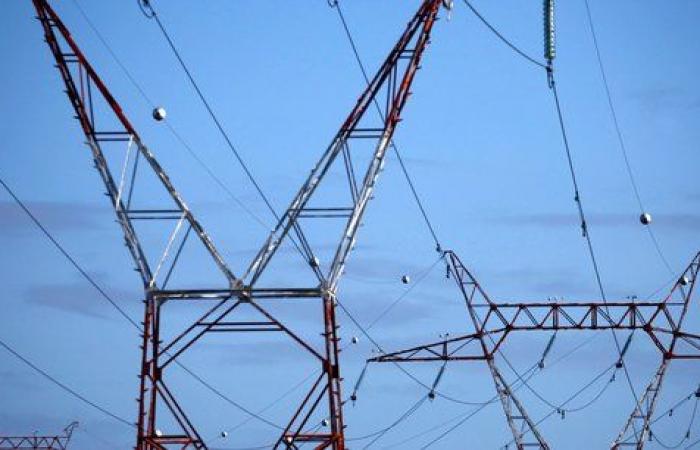What would happen if France and Germany, whose energy choices turn out to be very different, no longer exchanged electricity at all? A computer bug, which occurred yesterday, provides a brief overview: Epex, the main electricity exchange on the Old Continent, whereoperators indicate the prices and volumes they wish to buy or sell, had to conduct its own local auction due to significant technical difficulties.
So much so that border capacities have not been allocated between the two countries. “ For a few hours, everything went as if there were no longer any interconnections. That is to say, in this case, no more exports from France to Germany“, specifies Emeric de Vigan, head of electricity markets at Kpler.
And the result is striking: while France then showed a price of 2.96 euros per megawatt hour (MWh) for delivery the next day, this figure rose to 492 euros per MWh across the Rhine! That’s almost 160 times more. “ This confirms that at the moment, if we did not export, prices would fall here. », Comments the economist specializing in electricity markets Jacques Percebois.
France imports to get through the winter
Enough to give substance to the National Rally’s proposal to thoroughly review the rules of the European electricity market in order to reflect a “ prix national » ? On the contrary, believe the two specialists.
“This precisely shows the importance of optimizing exchanges. When we sell electricity abroad, we also make money; it’s good for the trade balance. And from a climatic point of view, this makes it possible to run nuclear reactors in France in order to turn off German gas plants! »justifies Emeric de Vigan.
Increase in electricity prices, financial difficulties… EDF has never received so many complaints from its customers
Above all, France does not always have an advantage over Germany: during the crisis of 2022 and 2023, the French economy had to rely massively on its German neighbor, otherwise its market prices would have been even higher. exploded.
« At first glance, this event gives water to the mill of those who say that France must be disconnected from the rest of Europe. But beware of hasty conclusions: we will be in the completely opposite situation this winter! Because when there is a cold snap, we generally count on German power stations to provide backup. », warns Jacques Percebois. What matters is therefore not the price at the moment T, but the smoothed average of prices over the year, including during consumption peaks, insists the economist.
Prices too low to pay producers
However, these would end up increasing if France benefited from very competitive prices, according to Jacques Percebois. “ It’s like the pork cycle: when prices fall, players stop investing in pork…so prices skyrocket since demand becomes greater than supply. For electricity, it’s the same », he explains.
And for good reason: no producer would sell their electricity at 3 euros per MWh on the spot market without incurring losses. If EDF, for example, sold for less than 60 euros per MWh, the company would no longer cover the production costs of its nuclear fleet. And therefore, would no longer invest, which would lead to a production deficit.
In France, the big drop in electricity prices
For the economist, this demonstrates one thing: in order to free ourselves from the volatility of daily auctions, we must increase the number of long-term contracts, which fix in advance a selling price for electricity. And in particular the “contracts for difference” (CfD), these deals negotiated between an operator and the public authorities, which already exist in France for wind and solar power.
Concretely, these provide that the State financially compensates energy producers when prices on the market are lower than the target price set during calls for tenders, in order to encourage their development…but also, in return , a payment of the surplus to the public authorities when these prices are higher. “ By setting a ceiling price and a floor price, this gives visibility to everyone, producers and consumers alike. », says Jacques Percebois.
Towards a change of gear from the government?
Until a few months ago, the French government hoped to regulate the entire atomic fleet in this way, by capping the sale price of nuclear electricity at a level close to EDF’s production costs, estimated at around 60 euros per MWh by the Energy Regulatory Commission. He had also obtained the possibility of doing so thanks to the reform of the electricity market, voted on last year in Brussels.
Nuclear price: in the middle of the campaign, Bruno Le Maire puts pressure on EDF
But at the end of 2023, the option was finally refused by EDF, opposed to the idea of seeing its prices regulated by the State. Nevertheless, Jacques Percebois is convinced of it: “ The government will eventually reverse course and impose this type of solution “, he assures.
At the Medef meeting last Thursday, the Minister of the Economy, Bruno Le Maire, also affirmed that he “ will reopen the negotiation of contracts with EDF because the exit price is not sufficient […] for French industry “. Enough to prepare minds for a change in policy, subject, of course, to a victory in the legislative elections…
In European countries, very different market prices
Even without computer problems, market prices have been diverging for several weeks between France and Germany, even if the gap is much less significant. This Wednesday, even though everything had returned to normal on the EPEX stock exchange, France posted a price of 67.50 per MWh for delivery the next day, compared to 95.75 per MWh for its neighbor across the Rhine.
And for good reason: France no longer needs gas, or very little, to generate its electricity. While in Germany, fossil fuel power plants continue to operate extensively, pushing prices up. Enough to undermine the idea that the European electricity market would result in an identical price for all member countries, whatever their national production choices.
« There are many interconnections between States which promote convergence of prices, but they are not without limits. It regularly happens that they are saturated, and the market anticipates this by reasoning by price zones », underlined last May Nicolas Goldberg, senior manager Energy at Colombus Consulting.







